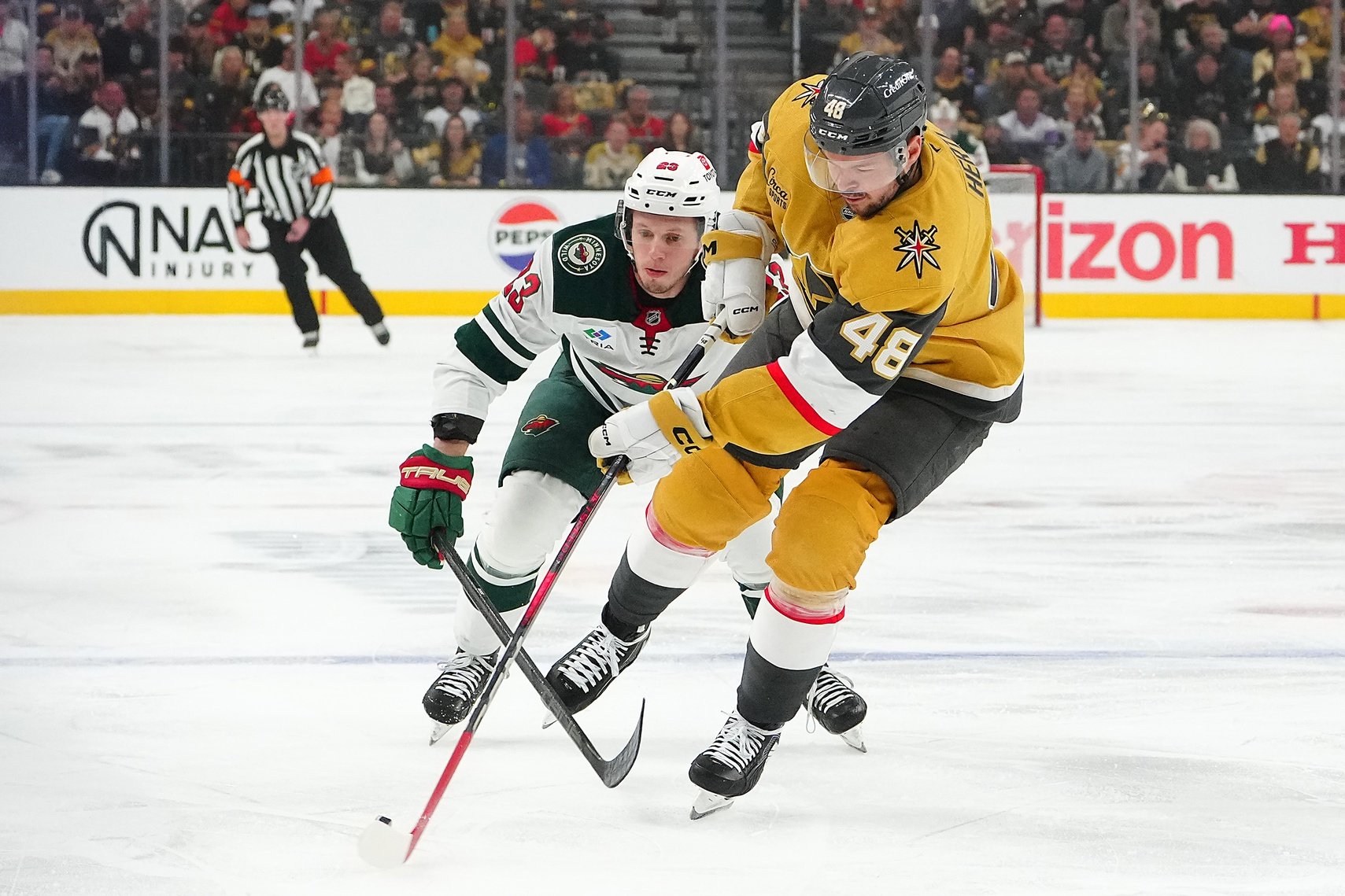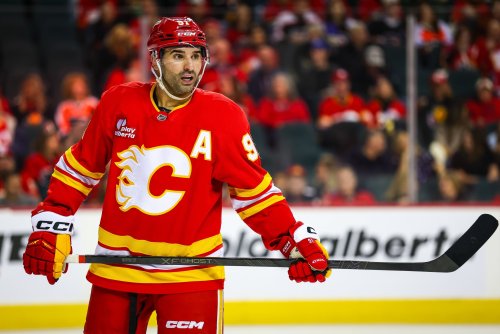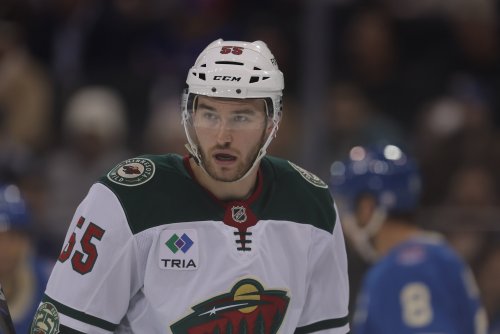
Somehow, the biggest lightning rod in the Minnesota Wild's abbreviated playoff run was the player with the team's third-fewest minutes. But that's what fans will focus on when a team takes Marco Rossi, their second-leading scorer in the regular season, and plays him for 11 minutes and 8 seconds per night.
For context, that's less than Marat Khusnutdinov, a fourth-line center with seven points in 57 games, got during the regular season.
Having seen the Wild's postseason play out, it's clear what happened. John Hynes (and possibly Bill Guerin, judging from some of his radio comments) decided that Rossi couldn't make an impact in a series against the Vegas Golden Knights. He started on the third line with Marcus Foligno and a clearly washed Gustav Nyquist, a role Rossi hadn't been in all season. After struggling in his playoff debut, the Wild demoted him to the fourth line with Yakov Trenin and Justin Brazeau.
And that's where he stayed. Scoring goals in back-to-back games didn't get him out of the doghouse. Engaging physically in Game 5, where he registered three hits and three blocked shots, didn't do the trick, either. No style of play, no level of success was getting him off the fourth line. There was nothing he could do.
In doing so, the Wild doomed Rossi to their self-fulfilling prophecy. By treating him as if he couldn't make an impact, they put him in a position where he was least capable of making one. Despite the three points in six games -- a 0.50 PPG average that is, mind you, tied for 19th in franchise history, between Kevin Fiala (0.53 PPG) and Mikko Koivu (0.47) -- Minnesota got a result they can point to and back up their suspicions.
His detractors (including those in the Wild organization) can point to three flashpoints:
- Rossi being on the ice for the Game 5 overtime goal.
- His double minor in Game 6.
- And his having the worst expected goals percentage at 5-on-5 this series, as noted by The Athletic.
Make of the errors what you'd like, I guess. Rossi was part of that Game 5 breakdown -- although there's a pretty good case that Zach Bogosian was more responsible. Even though Brayden McNabb lifted Rossi's stick into his own face in Game 6, Rossi still has to control his stick.
But as for his expected goals percentage... what did the Wild expect?
Out of 18 forwards with 150-plus minutes at 5-on-5 for the Wild during the regular season, Trenin was 10th in goals for percentage (44.4) and 11th in expected goals for percentage (47.5). Brazeau ranked dead last in both categories. Both players were in the bottom half of generating actual and expected goals per hour.
That trio didn't generate offense outside of two nice passes off a Trenin forecheck. The Rossi-Trenin duo combined to get just a 28.5% share of the expected goals in their limited time on the ice. Minnesota generated expected goals at a rate of 0.99 per hour with that tandem, which is abysmal. When apart from Trenin, his expected goals share boosted up to 49.3%, and the Wild generated 2.44 expected goals per hour.
If you're looking for a reason why Rossi would have disappointing numbers with Trenin and Brazeau, it's not hard to figure out. There's a reason Hynes doesn't consider playing Matt Boldy or Kirill Kaprizov on the fourth line for an entire playoff series.
Maybe you're thinking something like, Look, a player isn't entitled to a spot in the lineup because they scored 60 points in the regular season. This is professional sports. It's not about fairness or being a hard-working kid with a good attitude who does everything the team asks of him. It's about results.
And, hey, maybe that's right. So let's take a look at Rossi's results.
In 66:47 of all-situations time, Rossi scored three points. Mind you, only 3:30 of that was on the power play, less time than the likes of Nyquist and Marcus Johansson. Despite being a power play afterthought, he put up 2.70 points per hour during his ice time.
For fun, here's a list of Wild players who Rossi's career points per hour rate beats out:
Zach Parise, 2.66 points per hour
Kirill Kaprizov, 2.40 points per hour
Marian Gaborik, 2.36 points per hour
Ryan Hartman, 2.30 points per hour
Jason Pominville, 2.28 points per hour
Wes Walz, 2.26 points per hour
Brian Rolston, 2.03 points per hour
Kevin Fiala, 1.89 points per hour
Pavol Demitra, 1.86 points per hour
Matt Boldy, 1.86 points per hour
Eric Staal, 1.86 points per hour
Nino Niederreiter, 1.82 points per hour
Small sample size, but damn, that sounds like someone Minnesota should've put on the ice if they wanted not to lose three games by a goal each.
Only Hynes didn't do that. It's one thing for a coach to bury his team's second-leading scorer on the fourth line and win the series. They can claim they pushed the right buttons, and scoreboard. Who's gonna argue? But when they lose a series of one-goal games? There are gonna be questions to answer, especially for a coach whose playoff results aren't exactly above reproach.
It was a predictable outcome for the Wild, partly because they ensured it, both for Rossi and the series as a whole. Minnesota played Rossi on the fourth line, and now they can claim he played like a fourth liner. That makes sense. The logical conclusion for Hynes turning his third-most-potent scoring threat into a fourth-liner was the one we saw.
The Wild offense drying up the second Kaprizov and Boldy started running out of gas.
Don't worry -- with the increasingly inevitable Rossi trade coming up, it appears that no lessons will be learned from any of this.
Think you could write a story like this? Hockey Wilderness wants you to develop your voice, find an audience, and we'll pay you to do it. Just fill out this form.
-
 5
5
-
 6
6






Recommended Comments
Join the conversation
You can post now and register later. If you have an account, sign in now to post with your account.
Note: Your post will require moderator approval before it will be visible.